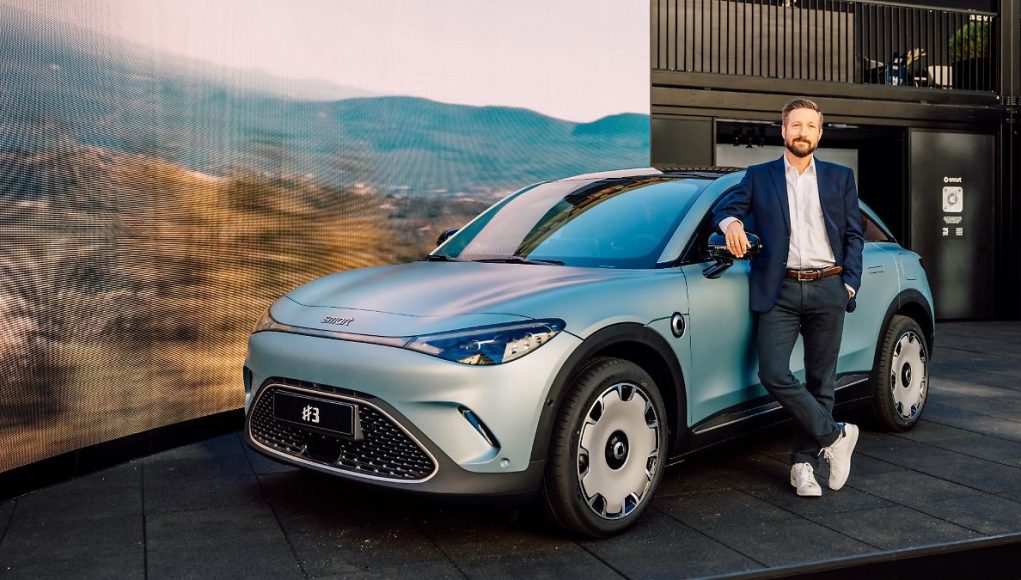Dirk Adelmann, Smart Europe boss
“We are seeing an anti-electric car sentiment”
The electric car manufacturer Smart is also affected by punitive tariffs on Chinese cars. The former small car manufacturer is now half owned by the Geely Group and currently builds its cars in China. European boss Dirk Adelmann has taken a clear position in the current debate.
sp-x: The EU Commission has just imposed provisional punitive tariffs on electric cars from Chinese factories. Smart will also be affected. You probably don't like that very much, do you?
Dirk Adelmann: I believe that we in Germany have benefited from free trade and globalization in general for decades. And I personally am of the clear opinion that protectionism is a path that definitely does us more harm than good. And I'm not talking about blows and counter-blows and escalating the situation, but I generally believe that restricting free trade cannot be in the interests of Europe, not in the interests of Germany, and not in the interests of Smart in general.
What concrete impact would higher tariffs have on prices?
This is relatively easy to calculate, not specifically for Smart, but in general. An increase in import duties of 20 or 21 percent is usually accompanied by a price increase of 17 to 19 percent if the additional costs are to be passed on to customers in full. But that is currently purely hypothetical. We are confident that the EU Commission and China will find a solution by November 2 at the latest, when the provisional duties would become regular.
What could such a solution look like?
A more intelligent solution could be a quota system instead of tariff increases. At the moment we are talking about a market share of Chinese manufacturers of well under 5 percent. That is really marginal. And if necessary, something like that can be regulated in other ways than with tariffs. In general, however, we also believe that the tariff increase will have no effect at all, at least for the companies affected. We have some competitors who have already announced that they will not export cheap and climate-friendly battery-electric vehicles to Europe, but rather plug-in hybrids or combustion vehicles. Then we would have managed to completely dry up the delicate plant of electromobility in Europe.
The tariffs would come at an inopportune time for e-mobility. Demand is already at a low level.
Yes, we are indeed seeing a kind of anti-electric car sentiment in several European countries. In Germany, this has arisen not least because of the overnight suspension of subsidies. This has led to many customers feeling uncertain, and not just here. And that is the worst thing you can do in such a phase of transformation towards climate-neutral mobility. In the end, the industry took over the subsidies that the state was no longer paying at short notice because the customer orders had already come in and we didn't want to let our customers down. But trust had already been damaged.
One problem that lies behind this whole discussion is obviously the overcapacity that exists in China.
The pressure in China is indeed enormous. I am not a fan of aggressive terms, but there is indeed a price war going on there. However, it will probably be over in two to three years, because by then two thirds of the manufacturers will have either disappeared from the market or been taken over by others. After this wave of consolidation, the issue of overcapacity will be resolved to some extent. But apart from that, I do not believe that the high production in China is a key problem for us Europeans. If Europe really were the main sales channel for the overcapacity in China, then we would have significantly more Chinese vehicles or vehicles produced in China here than we see now.
How does China actually view this tariff discussion? There were obviously emotional reactions as well.
Yes, in the short term, because there was very little understanding for the EU's actions. However, you have to give the Commission credit for conducting an investigation and examining the matter very carefully over several months, in contrast to the US, which had increased tariffs on Chinese products, particularly electric cars, at very short notice two weeks earlier. I believe that the strong reaction in China also had something to do with the timing. In China, one could get the impression that a kind of anti-China sentiment had arisen in the West.
Is Smart actually perceived as a Chinese brand in Germany?
We are perceived as a European brand and act as such. And that is how we position ourselves in China to differentiate ourselves from the competition. We focus primarily on the design, which is the responsibility of Mercedes-Benz. We also have our development center for Europe in Renningen, the birthplace of the Smart. This means that we remain a European brand at heart, even if the vehicles are built in China and mostly use Geely technology.
































